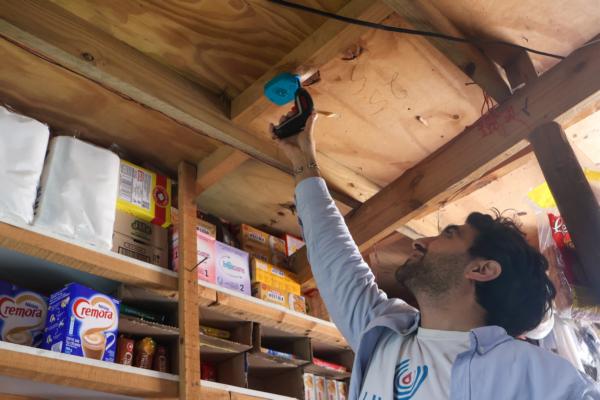
Lumkani is a company that works on solutions to help communities in informal settlements become more resilient in the face of fires. At least one person dies in the 15 to 30 potentially devastating fires that break out in informal settlements in South Africa every day, according to research conducted in 2020 by Stellenbosch University.
Lumkani’s innovative fire detection system has limited the spread of 150 fires in South Africa over the past three years – about 95% of fires detected.
Lumkani is named for its award-winning fire detector, specially designed for informal settlements. Unlike a smoke detector (which serves no practical use in communities where people use fires for cooking and heating), the palm-sized Lumkani device triggers an alarm when it detects a rapid temperature increase in a small space. It then instantly triggers other Lumkani devices in neighbouring homes (within a 60m radius) and sends out SMSs, creating a community-wide alert.
Lumkani has hired 300 agents from within target market communities around the country – all women – thus creating employment opportunities within these communities. Two-thirds of their clients are women as well.
Francois Petousis, CEO and director at Lumkani says Lumkani’s own experience shows that early detection of fires is key to keeping communities safe.
Lumkani devices have been installed in more than 60 000 homes over the past decade, and over the past three years alone have prevented the spread of more than 150 fires, saving nearly 200 000 lives and around R130-million worth of property.
Lumkani is now working with Hollard, South Africa’s largest privately owned insurer group, to offer fire protection cover along with the device – a potent combination for resilience.The partnership with Hollard means that the device is offered with fire protection cover of up to R40 000, for a premium of R80 a month.
Petousis says the partnership with Hollard has increased access to the devices. “By the time we engaged with Hollard, we’d already taken our technology to communities and proved it worked. The challenge is that getting out more devices is dependent on funding; you’re constantly waiting for funding to come along, to make communities safe. This solution helps communities access the device themselves by contributing toward the effort.”
More than 11 000 people have signed up for the fire protection cover in Lumkani’s three main coverage areas – Johannesburg, Pretoria and Cape Town. Claims to the value of R19-million have been paid out.
Petousis says what was unexpected is the impact of what’s arguably the first short-term insurance product for people living in informal settlements.

“We did a study in one region after our roll-out, and nearly 90% of people said they were purchasing more goods now that they knew they had cover in the event of a fire. They were saying: ‘I can put money and value into my home because it’s covered.’
“That was such a powerful conversation – seeing how creating that protection and safety starts to change the way that people build their lives and wealth.”
Lumkani is also attracting interest internationally. The device has been rolled-out in 300 homes in Kenya and 2 500 homes in Bangladesh.
“Our long-term goal is to find more opportunities to provide technology and similar financial services in regions around the world,” says Petousis.
Last year Lumkani was selected as one of 10 start-ups in Africa to receive venture funding from Habitat for Humanity’s ShelterTech accelerator, which scales up innovative projects that help meet the shelter needs of low-income families.
The solution was also awarded the EU’s European Innovation Council Prize in 2020 and Lumkani was also named one of the most innovative companies in Africa by Forbes. Petousis was named Social Entrepreneur of the Year’ at the recent 2023 Krutham Africa awards.